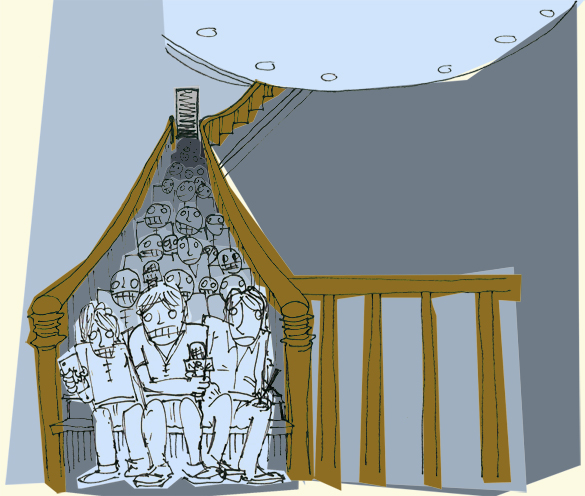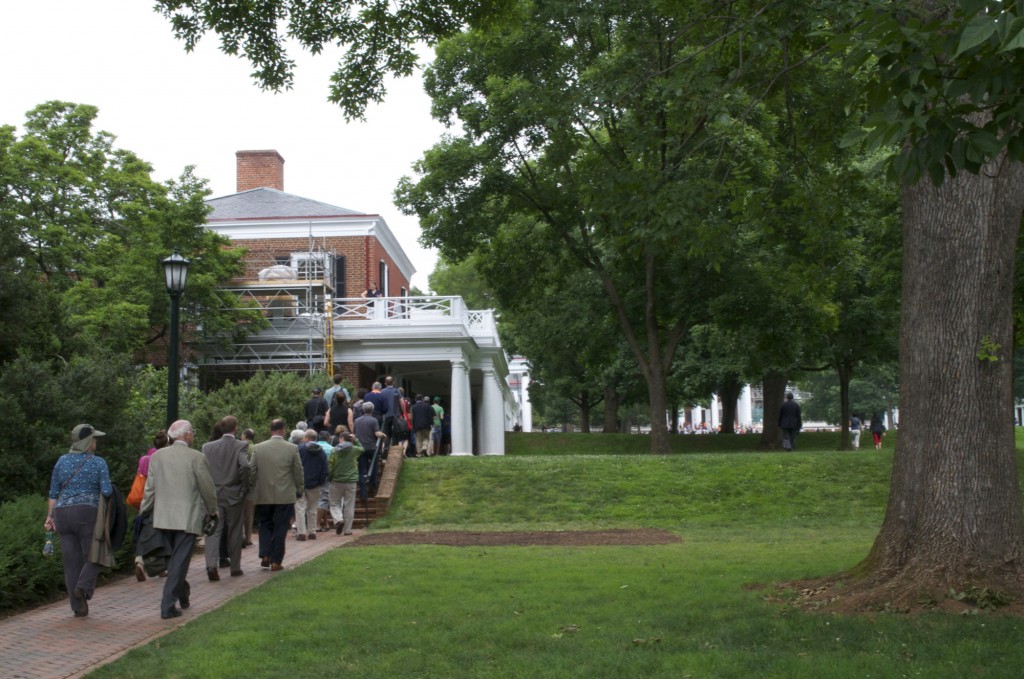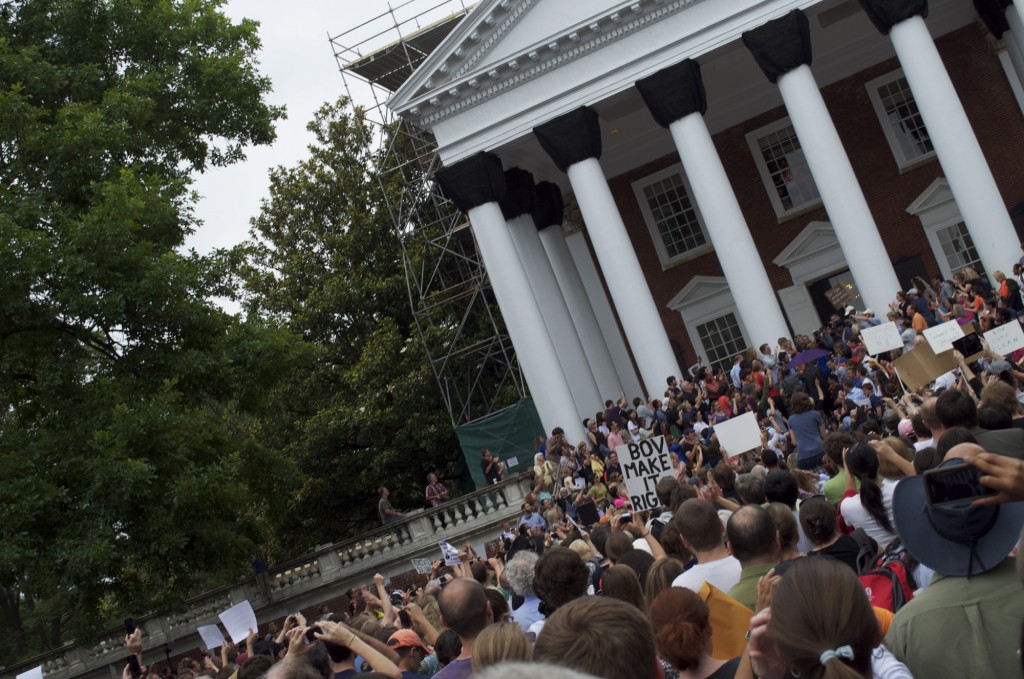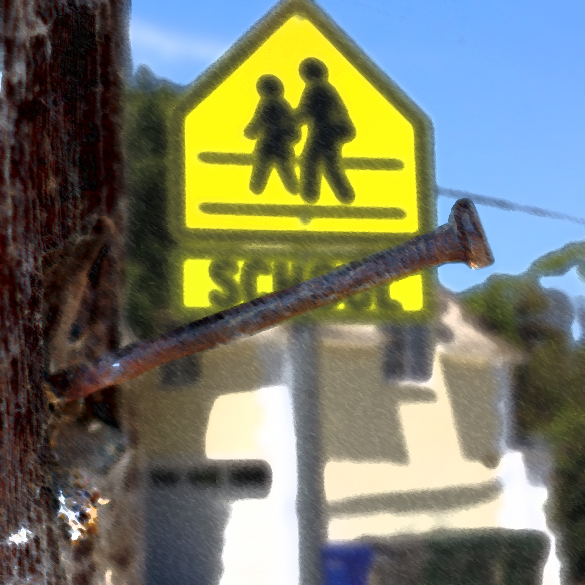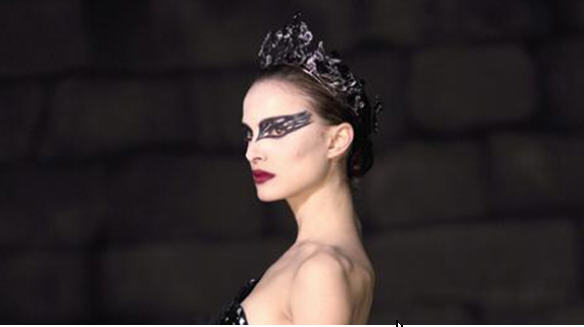Charlottesville, VA
June 18, 2012
I headed towards Grounds about an hour before the Board of Visitors meeting was to begin at 3:00pm. It had rained that morning, and my boots got muddy as I took my normal route to Grounds across the train tracks and down Madison Lane. The television stations were already there, setting up cameras and running wires from their satellite dish and antenna-laden vans to the Lawn. The heels of a shiny-faced television reporter clicked on the brick plaza behind me as I walked up the north-facing Rotunda stairs to see the graffiti someone had done on the columns overnights. The message, “GREEED,” was already painted over.
The Lawn still had its summer air of sleepiness; most of the people on it were facilities staff or contractors, working on the vacant-for-the-summer residences that line the East and West edges. A couple of generators roared and hoses attached to them ran into the rooms and up their nineteenth century chimneys, sucking out what I imagined to be centuries of collected soot. When I stepped on one of the hoses unwittingly, it felt like a foot. I turned and said “sorry” to no one.
WTJU, the community-supported radio station run out of UVa, had a table set up on the brick path to the left of the Rotunda, looking at it from the Lawn (neither of which, by the way, have a good synonym, so I apologize for the thirteen “Lawn”s, and the twenty-four “Rotunda”s you’re about to read). They played music, but not loudly enough to be heard over the generators. The morning’s rain hadn’t been heavy, though the clouds overhead seemed to promise more for later. In the overcast light, the grass and tress took on a fresh shade of green against the light grey sky. People had begun trickling onto the Lawn, where, lacking any clear course of action, they then stood around, and, like me, waited.
…
At about 2:30pm, people began to stream onto the Lawn, emerging suddenly from the dozen or so paths that lead to it. The staff shut off the generators and packed up, locking the Lawn rooms again. Faculty arrived in clumps from their various departments, and patches of white coats appeared from the Medical and Nursing schools. I saw some of my friends in the throng, and by the time I reached them and exchanged pleasantries, a proper crowd had formed. Some people passed out signs calling for “a more transparent UVa,” but almost everyone else stood around and talked, agreeing with each other about how poorly Rector Helen Dragas and the rest of the BOV had handled everything. As a cheer went up to greet former University president John Casteen, an outspoken critic of the current BOV, my friend said that the mood reminded him of an a capella concert. We headed for the Rotunda steps to get a better look at Casteen, who had been ringed in by the press with their cameras and mics close to the WTJU table. The crowd had now swelled to between one and two thousand people, according to the radio DJ, which left the Lawn just about half-covered in protestors.
I took out my voice recorder and wandered into the crowd to do some journalisming, feeling a bit nervous about confronting people at random to ask their opinions, as I always had when I wrote “students react to such and such news” articles for the student paper. I ducked into the throng, and looked for people who looked like they had something to say. This is not an easily identified characteristic, even at a rally for transparency, and some of the people I approached, especially staff, were still genuinely afraid of what might happen to them if they talked to the press at that point. Those wearing their UVa name tags shied away from me when they saw my little silver recorder, and one woman wouldn’t respond to me verbally at all, she just kept shaking her head “no” until I gave up after ten seconds of me promising her anonymity. Most staff and almost all faculty, students and at-large Charlottesvillians were willing to talk though, especially if I didn’t ask for their names, despite no one having heard of Gadfly. I asked everyone, “What brings you to the Lawn today?” Here’s a smattering of the more note-worthy responses I received:
“We are here to provide our support to the president of the University. Information has not been clear, and we are just seeking the truth.” Frank Butros, Administrator of the Department of Pathology at the medical school.
“We disapprove of the nontransparent ways that the BOV has conducted itself.” Andrew Hersey, Preparator at the UVa Art Museum.
“It doesn’t really matter where her heart was, no one really trusts [Dragas’s] leadership anymore.” said a newly minted UVa politics Ph.D.
“Disgust I suppose.” Harry Gamble, a religion professor whose excellent class on the Gospels I took last summer. He elaborated, through a thick Appalachian drawl and thicker mustache, “This is an institutional manifestation of the ninety-nine percent versus the one percent.”
“I will admit that I did not pay much attention to President Sullivan, but as a result of this I’ve done research and I’m much more educated about the situation.” Travis, an optimistic young alum who chose not to give his last name. He repeated the phrase, “triumph out of tragedy” many times as I talked with him.
“You have these people in business thinking they know how to run education better than educators. That’s a very frustrating feeling, that’s a very scary feeling.” Another anonymous alum who stood with Travis in the shade of the colonnade.
“Accumulated resentment.” Steven Cushman, Robert C. Taylor professor of English since 1982, who was ripping through an everything bagel before I spoke to him. He paused his consumption to explain that “since the early 1990’s the state has steadily withdrawn support for the University, and the people who have been here that long have watched support for the University evaporate while the state retains complete control over the Board and everything else, and gradually the autonomy we have as scholars, as teachers has been eroded—not to mention compensation. Places like the University of Arkansas are giving their faculty raises, and we, a flagship institution, aren’t getting anything. People have been getting angry over a long period of time, and this suddenly pulled the stopper off the bottle, and look, look around.”
…
At 3:30 a very loud cheer went up, and the crowd surged towards the center of the Lawn. President Sullivan had arrived, and she walked out of one of the Pavilions and straight through the center of the crowd. I ran from the edge, ducking between and around groups of people, nearly knocking one woman over in my rush. Sullivan was being ushered by the former Chair of UVa’s faculty senate, Gweneth West, who wore red rimmed glasses and carried a purple umbrella over Sullivan’s head. Sullivan’s husband, law professor Doug Laycock, Chair of the Faculty Senate, George Cohen and the silver-haired associate Dean of Students Francis Laushway rounded out the train. When she emerged on the Rotunda steps, she was let in through the front door, which I had never seen or even heard of being opened before.
My friend, Andrew, had stayed put on the Rotunda after I left to wander the crowd and play journalist. He had to move from his place in the middle of the columns to let the Presidential parade through. From his perspective, “the crowd swelled around her as she approached, and there was sheer applause and hysteria in the best of ways. Maybe the most incredible thing was the way the crowd just naturally parted, like no one was trying to confront her as much as let her pass and show their gratitude, appreciation and support. Once the doors opened, the yelling reached a crescendo, knowing that the Board of Visitors was inside and could hear the support we were giving her. She seemed unfazed, totally taking it all in stride.”
After lingering in the dying applause outside, Andrew and I made our way into the Rotunda by way of the normal, public entrance on the lower floor. One of the cops at the entrance told us that members of the public were not allowed on the second floor, where the BOV was meeting, so we made our way to the third, the Dome Room. We glanced out the windows overlooking the Lawn, still half-full with protestors. While the outside had the positive vibes of a community proud to come together, the inside felt tight with pressure. Standing on the staircase to the Dome room, we saw Sullivan’s entourage of academic higher-ups mulling around in the middle of the Upper Entrance Hall, all either crossing their arms or anxiously poking their smart phone screens. Members of the press were spread around the edge of the room, many with laptops open, drafting their stories or updating Twitter feeds. Photographers paced about, large-lensed cameras dangling around their hips from shoulder straps. Right beside the door to the East Oval Room, where Sullivan was speaking to the BOV, stood her husband and a cop, both looking concerned next to the unflappable Thomas Jefferson statue.
All of these people came to life very suddenly when the doors opened. Before entering the fray, Sullivan took a minute to speak inaudibly to her husband in the corner, and then she walked slowly into middle of the room not smiling, not reacting to the barrage of questions that started spewing forth from the TV reporters. West took the lead again with her purple umbrella, clearing a path through the press. She was let through the hallowed front door again, and Andrew and I hopped down the stairs and tagged along in the wake of the press train as it went out the door. It’s an exhilarating thing to have thousands of people cheering as you walk through a doorway that gets opened seemingly only once every few decades.
The pleasures of walking through a door were lost on Sullivan though, and as she walked up to the microphone set up on the steps of the Rotunda to address the crowd, she could only manage a meager smile. Sullivan has a sweet, reassuring voice. She spoke seemingly off the top of her head, praising the University in broad, clichéd terms that, in context and in her tired voice, managed to sound incredibly sincere. “You do great work every day, and I want to thank you for making this a great University.” She spoke for just thirty seconds, but she received resounding applause that lasted until she left the Lawn. A song rose out of the crowd, our fight song “The Good Ole Song,” but only the younger members of the crowd seemed to sing and then pump their fists during the “rayray U-V-A” part at the end.
…
With thirty minutes until the BOV meeting was supposed to end, my friends left for work and I wandered back into the Rotunda to try and get another good view of the important people coming out of the important room. I recognized a guy and a girl from the Cavalier Daily, the student paper that I had spent my first three years at UVa writing for. Both were typing away on their laptops, but I said hi anyways. “Hey, you’re with the Cav Daily right? You guys have been doing a great job covering this whole fiasco,” I said.
She wore her hair down to her shoulders and dressed business casual—white blouse, black pants though with colorful flats. He had short, curly brown hair and wore thin, metal framed glasses, a dark grey Cavalier Daily shirt turned backwards so as to display the large “Cavalier Daily” logo forwards, with jeans and dark grey Nike Air Force Ones. They thanked me and I introduced myself, to which Krista Pedersen responded, “I know who you are,” with the curt matter-of-factness of a busy journalist, which she was. I wandered up the stairs to get the same view I had before of the press members waiting for the Board’s door to open.
The Rotunda staff closed the building to the public after 5:00, leaving only the Board members and the press in the building. The University spokesperson Carol Wood, a woman with blonde hair, infinite patience and a rarely broken air of professional cordiality, went around asking everyone if they were with the press, and if so, for which outlet. When she reached me, sitting on the stairs with my little notebook, she seemed somewhat skeptical. “I’m with Gadfly, a culture magazine slash website,” I said. She moved on, apparently satisfied. I texted a friend and my girlfriend to tell them I’d managed to stay in the now press-only Rotunda. Then my phone ran out of battery life.
We, the members of the press, soon found out that the BOV was going to break for dinner, and that the upstairs Dome Room would be available for us to work in. From there, I took notes on the crowd standing beside the central, south-facing window, from which you can glimpse, over the tree line and buildings, the mountains and foothills southeast of Charlottesville. The BOV meeting was supposed to only go until five, so after that point the crowd dwindled down to a significant clump. You could see people shifting their weight from one foot to the other as they started to tire of standing. Behind the crowd, children chased each other, and further back some undergrad types tossed a Frisbee back and forth with apparent carelessness.
…
The pair from the Cav Daily soon took up residence in chairs in front of the window; I sat slightly back from them jotting further notes on the crowd and on them. They were eating bagel sandwiches from the nearby Bodos, taking a break from composing and posting articles to their website, which went down several times during the evening due to increased traffic. The interactions between the amicably curt Krista Pedersen and the earnest, loquacious Aaron Eisen, were comical; she, the news editor, did all the reporting and writing, while he, the executive editor, facilitated the posting of it all to their website. She worked quietly in front of the window while he wondered aloud about the future of the University, which prompted her to shush him multiple times before he could really get any rhetorical momentum going.
Seeking quiet, I took a table for myself in one of the alcoves of the Dome Room. I scribbled down my memories of the afternoon in a pocket-sized notebook, taking breaks to look at the nineteenth century books displayed around the room. Time rolled by; the hourly chimes of a clock somewhere in the Rotunda seemed frequent. My feet became uncomfortably damp and hot inside of my hiking boots, but I was still afraid that the moment I took them off, the East Oval Room doors would swing open and the professional press would rush in and I’d miss everything. I didn’t take my boots off all night.
A guy wearing a navy UVa polo with khaki shorts and a girl wearing an orange Virginia t-shirt interrupted my writing. They entered the Dome Room looking as if they were lost on their way to the football game. When he shook my hand I could smell beer on the ends of his breath, and he said he’d been getting drunk the past few hours and was now wondering if anything had happened. Nothing had. He told me he was going to be submitting a long-form piece on the day’s protest to two different major, national published print outlets, the names of which caused me to double take. He stated that the Dome Room would make a wonderful place to smoke a bowl, and then he wrote down his contact info for me and left to seek out a real reporter that could verify that nothing had happened. I went back to impulsively checking my dead phone, wandering over to the window to see how much smaller the crowd had gotten, looking at the old book covers, writing and waiting. “I can’t wait for this to be over,” groaned a photographer from the other side of the room.
…
After nearly four hours in the air-conditioned Dome Room, I was cold, except for my feet which were still hot, and tired of chasing thoughts about what I should say about what all this protest meant and such. Sitting back down at my spot on the stairs overlooking the media camp on the second floor, I noticed that it had become loud as the reporters grew angsty and hungry. They drafted articles, cruised Twitter, talked about where they should get food from, asked around for phone and computer chargers or just played cell phone games to kill off boredom. It was warmer there, but I craved the outdoor, summertime-in-Virginia humidity, in which there were still maybe a hundred or so people gathered around the Rotunda in the post-sunset twilight. The mix of students and older types all still talked about Sullivan, Dragas and the Board, what had happened, why it was wrong, what might happen in the near and distant future, and about why they cared. The fireflies had come out, and a sheet of hundreds if not thousands of their soft lights laid over the ash tree-lined Lawn.
…
“Are you still here? Why?” asked a bemused TV reporter into her phone. Back inside, I found myself listening to the journalists networking with each other as I settled back into my spot on the stairs. Occasionally I could see inside the East Oval Room as BOV members opened the large door to come in and out on their break. I had no idea who any of people in the room were, and my glimpses inside were brief and strange. Everyone wore varieties of business dress—khakis and blazers, or suits. A man in an orange tie sipped his drink out of a slender brown glass bottle (which I later learned was sparkling water, not beer as I first thought) with one hand casually in his pocket. The door closed, and then opened a few minutes later as another Visitor left. A man in a blue shirt, blue tie and stone khakis leaned back and laughed, while simultaneously grabbing his belt from under his protruding stomach to adjust his pants. He did this three times in the five seconds that the door was open. Other glimpses yielded only partial views of elbows or only the table and wall. “Anything could happen,” say the reporters to each other with professional apathy.
When Carol Wood, the University spokesperson, roamed across the room after disappearing from sight for a few minutes, a hush would follow her as we waited for some scrap of news to tumble forth from her mouth, but she has no idea what was happening either (Later, even she let her frustration show, calling the wait “exhausting” in a rare fit of subjectivity). Finally after one pass, we learned that the BOV had reconvened. The media edged closer to the door, pens clicked everywhere and the cameramen readied their tripods. Stragglers upstairs and downstairs rushed to the second floor to wait outside the East Oval Room. At 10pm, Someone says we’ve been given a fifteen minute warning. Gweneth West, who was still waiting with George Cohen as the representatives of the Faculty Senate, raised her arms like a conductor to quiet the excited press.
…
It’s now 11:00pm. Every time someone from the BOV comes out of the East Oval Room, a hush falls over the media camp. The last guy to come outside was rather red-faced. Half-sarcastic speculation comes across via Twitter that they’re trying to wait out the news shows, according to the Cavalier Daily people. I’ve moved from my sketchy roost on the west stairs down to their encampment at the base of the east stairs–now somewhat desperate for someone to talk to about what is or is not going on. They have no idea either, so we talk about our frustrations, or rather Aaron Eisen, the aforementioned Executive Editor, and I chat away while Krista Pedersen does relevant research and Matt Cameron, the Editor-in-Chief, casually feeds the Cavalier Daily’s thousands of new Twitter followers little tidbits of news. Aaron and I establish that he’s engaged in the same strange combination of majors, English and Econ, which I had finished only a month ago, and we start to get along well. He calls himself an idealist and a vegetarian, establishing two more shared neuroses, and we discuss what might happen tonight, what it might mean for the school that we feel, or felt, represents an outpost of idealism or at least something we could naively project our idealism onto. Both of us still held out hope that the BOV would reinstate Sullivan that night. The conversation always circled back a few sentences, correcting or clarifying whatever point we’d made previously. “I’m just reaching for the nearest hash tag,” remarked Aaron at one point.
He pressed me on what kind of story I would write, bringing up David Foster Wallace’s piece on the 2000 McCain campaign, gonzo and Freedom. I tell him that I have no idea, that ultimately the only advantage I have on the people who were in that room was that I would not normally be in that room, so I would just have to be honest to my perspective. Aaron fills me in on who the important people in the media are, but he has no idea who the people coming out of the room are either. “I have no idea whose important and whose not,” he says, before complaining that I’m writing down what he’s says. We go on like this for another two hours.
…
At 2:35am, the doors open and a sleepy but enlivened media files in. Walking into the room, one is immediately greeted by a large portrait of Jefferson above the fireplace. Fish-eyed mirrors hang on either end of the off-white, curved walls. A dark mahogany table takes up the better part of the room, and two gold chandeliers comprised of Argand-style (read: shaded) lamps hang over both ends of the table. Circles ran thick under the eyes of the board members, hands propped up heads, and generally everyone at the table looked emotionally and physically drained. The student representative to the BOV, Hillary Hurd, was still teary-eyed. The media filled the chairs along the curved wall, and the floor space between those chairs. When I sat down in one of the leather cushioned wood chairs near the right end of the room, there was still so much movement going on around me that I didn’t notice when Dragas began to speak, and I thought that Dean Laushway had been named interim president for one very confused minute because Vice-Rector Kington gestured in his direction when talking about the accomplishments of Dean Zeithaml, who was not even in the country. They did a roll call vote to establish the Commerce School Dean as the Interim President, and everyone except for Heywood Fralin said “yes,” or “abstain,” as the vote went around the table. Fralin spoke last, accidentally saying “yes” before he uttered his “no” petulantly, like a child refusing some vegetable that had been repeatedly offered to him. Dragas, to her credit, seemed more composed than anyone else in the room, and she smiled and laughed slightly when she introduced the resolution to make Zeithaml interim president. To her detriment though, the laugh and grin played into my imagining of her as an evil witch indifferent to the plight of her subjects. Going into a delirious reverie, I imagined Dragas emerging from the Rotunda and growing to twice its height. She screamed, “Oh no, where will you study German now, my pretties,” and cackled hysterically as she stomped on helpless protestors. (So much for my efforts to resist vilifying Dragas in this piece.)
I came to as she adjourned the meeting, and the more responsible journalists began cloistering around the important people to try and get their reactions on record. I tried to write something in my notepad for a minute, but my hand was shaking so I gave up, said some quick goodbyes to the Cavalier Daily staff, and made for the exit to see what the mood was like outside. As it so happened, a normal-sized Dragas walked down the stairs to the first floor just before me, and I followed her down the curving staircase as a reporter peppered her with questions. She responded with “no comment” and her now infamous smirk. At the bottom of the stairs, the rector headed for the back of the Rotunda, and I split off to go out the main entrance. Outside, a student wielding a large cardboard sign reading, “Emperor Dragas and Darth Kington Do Not Speak For Me,” waited against the wall with a stoic expression. He was clearly waiting for Dragas, so I told him she was going out the side entrance, which he immediately ran to.
There were still about fifty protestors spread around the Rotunda’s three main ground-level exits, the largest cluster of which stood along the path from the main entrance. Each time a board member passed through their midst, cries of “shame,” and “resign” rained down. No one attempted to block their paths, and the visitors walked through quickly with resolute indifference. The night was cool and, except for the hecklers, dead quiet; no one spoke unless they were yelling, and then the angry tones cut apart what would have been a serene night. Then TV reporters showed up and started shining lights in people’s faces to get their reactions.
When Dragas finally emerged, a crowd had amassed around the side door because someone had told everyone what door she would be emerging from. Surrounded by four cops, she started walking down the path towards McCormick Rd, and the crowd followed, and a couple of TV reporters managed to get mics in her face, which she chose not to respond to, other than with a caustic, “Don’t believe everything you read in the papers” (which begged the question, in the context of a ten hour closed meeting, who were we supposed to believe if not the press? They were and are the only people who, even now, have made any attempt to inform the public as to why exactly Sullivan’s ouster was so popular with the BOV that it didn’t even require a vote, and then why it was so unpopular with the same BOV—save Kington, who resigned—that they unanimously overturned their prior decision, which wasn’t even a decision, officially, because no meeting ever took place) and that smirk. All the way down the path, the crowd followed her like moths streaming after a moving light, yelling out, “resign, please resign,” “no confidence,” and the like. When she got to her grey Mazda 3, parked on the road outside of Alderman Library, perhaps one hundred yards from where she exited the Rotunda, she turned on the lights, and quickly escaped. I would give an arm and a leg to know how she felt at that moment—she looked defiant, but how demoralizing it must be to have an angry mob chase you just after spending ten hours in a high-pressure meeting, knowing that whatever you do will be reported on incessantly by every news outlet in your home state.
…
“What did you hope to achieve by making that sign?” I asked the guy who was holding the “Emperor Dragas” sign outside the Rotunda entrance, holding up my little silver recorder tentatively. Spenser Logan, a fourth year student, walked and spoke fast, clearly still flush with adrenaline from the chase. “Do you feel you achieved anything, in the last ten minutes or so?” I asked again, my voice trailing off as I realized how belittling the question was.
“I really feel like I did, and this started about fifteen hours ago,” he responded testily. “I made this sign after I got out of class at ten [in the morning], and went straight to the Rotunda and I sat down right in front of Thomas Jefferson with this sign until they made me leave the Rotunda. Then I waited outside, and I waited outside, and I waited outside, and I think I did accomplish something because I actually got her to answer one of my questions directly.”
“What was that?”
“‘My parents and me—I’m an out of state student—we pay almost fifty thousand dollars a year so I can go to this university, so what’s your obligation to me?’ Her response was, ‘It’s a board decision, we made a board decision.’ After all of that, all the opportunities she’s had to say something….”
(More to follow)
Illustration by Josh Whitehead
Photography by Jesse Saldana
12:21pm (7/9/12): Several typos and one accidentally left incomplete sentence completed. I also clarified the newly minted PhD’s quote, as the reference in “her leadership” was somewhat unclear. In the context of the conversation and the large anti-Dragas sign he held, it was clear he meant the rector’s leadership, not Sullivan’s. -MCC
